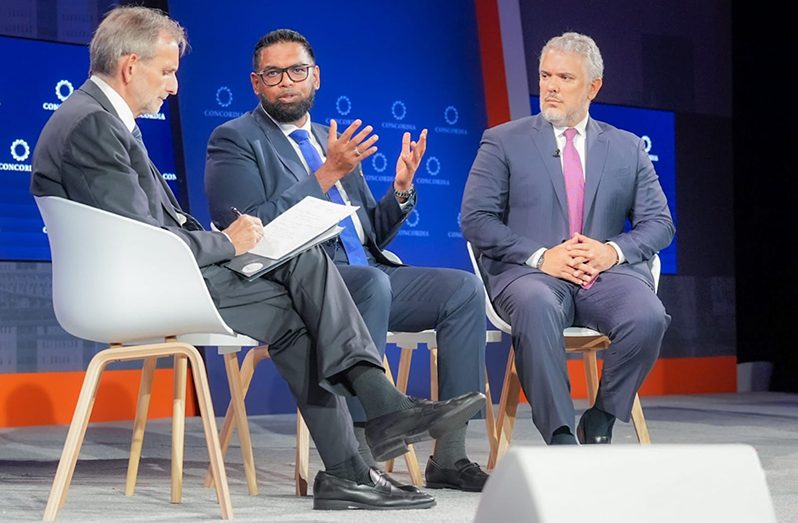President Ali says it is time to get all stakeholders around the table to have frank discussions
AMIDST the ongoing global discussions to address climate change, Guyana’s President, Dr. Irfaan Ali believes that those talks are becoming “derailed” and lack the element of balance.
President Ali, who joined several leaders in New York for the 78th session of the United Nations General Assembly, told a gathering at a Concordia sidelines event on Monday that in order for countries to achieve net zero, stakeholders from both the oil and gas industry and the climate change front will need to have roundtable discussions.
“The conversation along net zero has been derailed to the extent that it has now become a conversation on how to end petroleum, and not how do we create a balanced set of policies and programmes to achieve net zero in a sustainable way,” President Ali said.
He added: “For that balanced conversation to take place it requires all the stakeholders around the table and not the locking out [of] companies and countries who are investing in oil and petroleum products.”
“Net zero” is a term that means achieving a balance between the carbon emitted into the atmosphere and the carbon removed from it. This balance — or net zero — will happen when the amount of carbon added to the atmosphere is no more than the amount removed.
He further referenced Guyana’s own Low Carbon Development Strategy (LCDs) that provides a balanced framework for protecting Guyana’s forests and the environment.
The LDCS, Dr. Ali believes, could provide a blueprint for other forested countries. Guyana’s LCDS is a framework intended to map the path of a new growth trajectory in a non-polluting way.
Tropical-forest countries have long called for the ecosystem services provided by the world’s standing tropical forests to be properly valued, through both public and private finance.
This will enable people who live in forests and forested countries to create jobs and economic opportunities from an economy that works with nature.
The Architecture for REDD+ Transactions (ART), in December 2022, issued the world’s first TREES credits to Guyana.
This marked a milestone as the first time a country was issued carbon credits specifically designed for the voluntary and compliant carbon markets for successfully preventing forest loss and degradation — a process known as jurisdictional REDD+.
Following completion of an independent validation and verification process and approval by the ART Board of Directors, ART issued 33.47 million TREES credits to Guyana for the five-year period from 2016 to 2020.
This paved the way for a historic agreement between Hess Corporation and the Government of Guyana, whereby the oil giants opted to purchase about one-third of all Guyana’s credits (issued and anticipated) up to 2030.
The agreement will generate a minimum of US$750 million for Guyana over the coming decade and represents a major milestone on the journey towards a vision first set out in 2007.
However, President Ali contended that country’s like Guyana can earn more from its forest with a structured market.
“As I speak to you there is still an involuntary market. There is no structured carbon market for the forest when are we going to have that conversation as to how we are to finalise the arrangement to have a full-pledged, structured market for carbon storage and the role of the forest.”
Also joining the discussion, former President of Colombia, Ivan Duque said the countries such as Guyana need those funds to advance other sectors to provide improved services such as health and education.
“It is very important to understand [that] the global south has different challenges and we need to finance the transition not only the energy transition, the economic transition, the environmental transition in a sustainable way,” he said.
Duque, while lauding Guyana’s efforts, said for far too long leaders have strayed away from the importance of the forest in the fight against climate change.
“We talk a lot [about] fighting climate change [and] becoming carbon neutral, but without the Amazon none of the western hemisphere [Nationally Determined Contribution] NDCs will be met,” he said.
The NDC’s are countries’ self-defined national climate pledges under the Paris Agreement, detailing what they will do to help meet the global goal to pursue 1.5°C, adapt to climate impacts and ensure sufficient finance to support these efforts.








.png)







